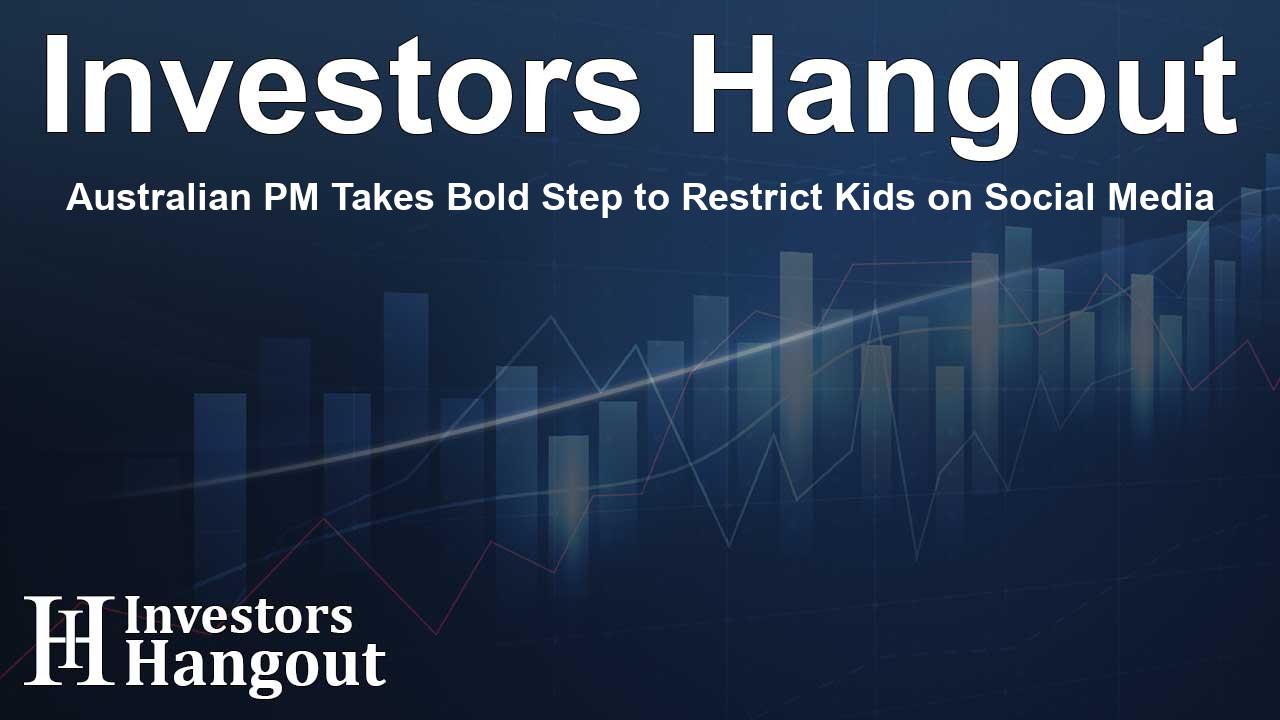Australian PM Takes Bold Step to Restrict Kids on Social Media

Australia Takes a Stand on Children's Social Media Use
The Australian government is preparing to roll out significant new legislation aimed at restricting children's access to popular social media platforms. This includes well-known names like Meta Platforms Inc.'s Instagram and Facebook, TikTok, which is owned by Bytedance, and Elon Musk's X. The driving force behind this legislative change is the growing concern over the health risks associated with minors using these platforms.
Prime Minister Albanese's Key Announcements
In a recent statement, Australian Prime Minister Anthony Albanese highlighted the urgent need to protect children's well-being. He announced that a proposed law would be introduced this year to discourage children from using social media, a move covered by various news outlets, including Reuters.
Encouraging Real-world Activities
Prime Minister Albanese firmly believes that children should focus on engaging in real-life activities instead of being drawn into the world of social media. He noted that extended exposure to these digital platforms can lead to considerable social harm.
Discussion on Age Limits
Although the specific age limits for the proposed ban are still under consideration, it seems that the targeted age group will be between 14 to 16 years old. Albanese has voiced his concerns about cyberbullying and the ease with which minors can access inappropriate and harmful content online.
Addressing Cyberbullying and Online Dangers
This new initiative follows an earlier request for internet companies to establish a robust, enforceable code aimed at protecting children from harmful material. Australian eSafety regulators have stressed the importance of implementing strict regulations, warning that non-compliance may result in mandatory measures being enforced.
A Global View on Social Media Issues
Prime Minister Albanese has also pointed out that the challenges posed by social media are not unique to Australia. Many countries around the globe are facing similar issues, and he acknowledged the complexity of the situation, stating, "This is a global issue that governments are trying to deal with..." This highlights the difficulties involved in creating effective legislative solutions.
Increased Scrutiny of Social Media Platforms
The proposed ban comes amid growing scrutiny of social media platforms. In previous criticisms, Albanese labeled the actions of Meta Platforms Inc. as "arrogant and irresponsible." He has urged these companies to continue financially supporting local news organizations to foster a more informed society.
Concerns Over Content Accessibility and Licensing
This criticism coincided with Meta's announcement about potentially blocking news content in Australia if required to pay licensing fees. These developments illustrate the rising tension between social media giants and national interests.
Recent Updates in Social Media Regulation
Earlier this year, Musk's company, formerly known as Twitter, secured a legal victory against the Australian government concerning the management of sensitive content. Musk emphasized the importance of preserving freedom of speech, even in the face of demands for more regulated content oversight.
Parliamentary Inquiry into Platform Operations
Additionally, the Australian government has initiated a parliamentary inquiry into the operations of major platforms such as Meta's Facebook, Musk's X, and TikTok. This inquiry aims to enhance accountability within these companies regarding their content management practices.
Conclusion
In summary, the Australian government's approach to limiting children's access to social media represents a significant shift towards ensuring the safety and well-being of children in an increasingly digital landscape. As lawmakers navigate the complexities surrounding online safety, parents, educators, and communities are encouraged to reflect on the broader implications of digital interactions on young minds.
Frequently Asked Questions
1. Why is the Australian government banning social media for kids?
The ban is primarily due to health concerns related to the impact of social media on children, including issues like cyberbullying and access to harmful content.
2. What age group will the social media ban target?
The proposed legislation intends to target children aged between 14 and 16 years, although exact age limits are still being discussed.
3. How will the ban affect major platforms like Meta and TikTok?
The ban will restrict access for minors to these platforms, compelling companies to implement age verification measures and adhere to stricter content guidelines.
4. What other countries are considering similar measures?
Governments around the world are facing similar challenges related to children's access to social media, indicating a growing global concern with this issue.
5. How are social media companies responding to this initiative?
Responses vary, with some companies facing criticism and calls for accountability, while others emphasize freedom of speech and operational autonomy in their platforms.
About The Author
Contact Hannah Lewis privately here. Or send an email with ATTN: Hannah Lewis as the subject to contact@investorshangout.com.
About Investors Hangout
Investors Hangout is a leading online stock forum for financial discussion and learning, offering a wide range of free tools and resources. It draws in traders of all levels, who exchange market knowledge, investigate trading tactics, and keep an eye on industry developments in real time. Featuring financial articles, stock message boards, quotes, charts, company profiles, and live news updates. Through cooperative learning and a wealth of informational resources, it helps users from novices creating their first portfolios to experts honing their techniques. Join Investors Hangout today: https://investorshangout.com/
The content of this article is based on factual, publicly available information and does not represent legal, financial, or investment advice. Investors Hangout does not offer financial advice, and the author is not a licensed financial advisor. Consult a qualified advisor before making any financial or investment decisions based on this article. This article should not be considered advice to purchase, sell, or hold any securities or other investments. If any of the material provided here is inaccurate, please contact us for corrections.
